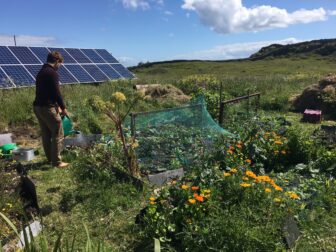
Bioregionalism: A Return to Source
We are living through a moment of intersecting crises: climate change, ecological collapse, geopolitical turmoil and a growing sense of disconnection from nature. In 2024, global temperatures rose to about
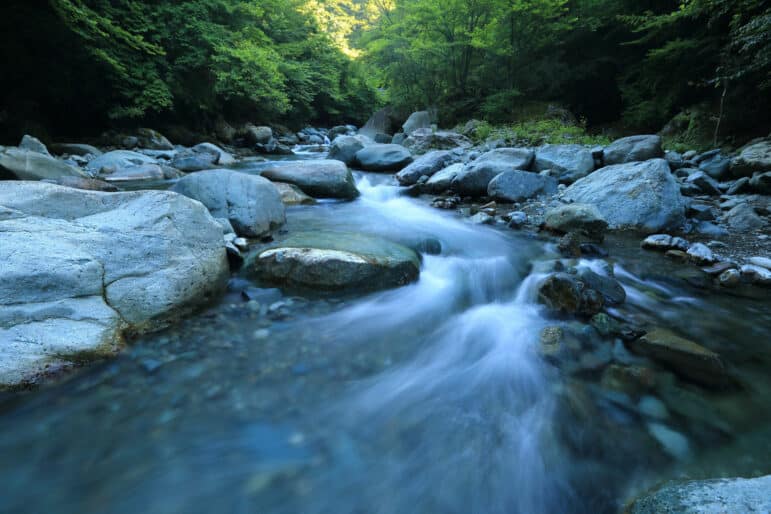
Burton L. Visotzky, American rabbi and scholar of Midrash. He is the Appleman Professor of Midrash
and Interreligious Studies at the Jewish Theological Seminary of America
Hussein Rashid, PhD, Founder of islamicate, L3C consultancy for religious literacy and cultural competency
Karenna Gore, Founder and Executive Director, Center for Earth Ethics
Mindahi Bastida, General Coordinator of the Otomi-Toltec Regional Council in Mexico,
former Director of the Original Caretakers Program at the Center for Earth Ethics
🌱 🌱 🌱
The opening words of the ENCYCLICAL LETTER LAUDATO SI’
OF THE HOLY FATHER
FRANCIS
ON CARE FOR OUR COMMON HOME
“Laudato si’, mi’ Signore” – “Praise be to you, my Lord”. In the words of this beautiful canticle, Saint Francis of Assisi reminds us that our common home is like a sister with whom we share our life and a beautiful mother who opens her arms to embrace us. “Praise be to you, my Lord, through our Sister, Mother Earth, who sustains and governs us, and who produces various fruit with coloured flowers and herbs”. This sister now cries out to us because of the harm we have inflicted on her by our irresponsible use and abuse of the goods with which God has endowed her. We have come to see ourselves as her lords and masters, entitled to plunder her at will. The violence present in our hearts, wounded by sin, is also reflected in the symptoms of sickness evident in the soil, in the water, in the air and in all forms of life. This is why the earth herself, burdened and laid waste, is among the most abandoned and maltreated of our poor; she “groans in travail” (Rom 8:22). We have forgotten that we ourselves are dust of the earth (cf. Gen 2:7); our very bodies are made up of her elements, we breathe her air and we receive life and refreshment from her waters.”
The author, Burton L. Visotzky, is an American rabbi and scholar of midrash. He is the Appleman Professor of Midrash and Interreligious Studies at the Jewish Theological Seminary of America.
Prayers for rain (Fall holiday) Dew (Spring holiday), Dew (Daily in season)[Jewish prayer-4.]
Ritual immersion (monthly) [Jewish prayer-5.]
Ritual immersion (conversion) [Jewish prayer-5.]
Ritual immersion (pre-marriage) [Jewish prayer-5.]
Purification of corpse[Jewish prayer-6.]
(keyed to above cycle)
AFTER USING the BATHROOM (FLUSHING): Praised are you God…Who fashioned humans with wisdom, and created within them many openings and many cavities. It is revealed and known before Your throne of glory, that if but one of them were to be ruptured, or but one of them were to be blocked, it would be impossible to survive and to stand before You. Blessed are You, God, Who heals all flesh and acts wondrously.
WASHING HANDS: Praised are you God… Who has commanded us to take [water upon our] hands.
UPON CONSUMING LIQUIDS:Praised are you God…for all things came into being through God’s word.
PRAYERS for the RAIN and DEW:
Rain
Our God and the God of our ancestors:
Remember the Patriarch Abraham, who was drawn behind You like water. You blessed him like a tree replanted alongside streams of water. You shielded him and rescued him from fire and water. You tested him when he sowed seed upon all waters.
Cong.- For his sake, do not withhold water!
Remember Isaac, born with the tidings of, ‘Please take a bit of water.‘ You asked of his father to slaughter him, to spill his blood like water. He too took care to pour out his heart like water. He dug and he found wells of water.
Cong.- For righteousness, grant abundance of water!
Remember Jacob, who carried his staff and crossed the water of the Jordan.
He dedicated his heart and rolled a stone off the mouth of a well of water,
as when he wrestled an angel composed of fire and water.
You promised to be with him through fire and water.
Cong. – For his sake, do not withhold water!
Remember Moses placed in a rush basket and drawn from the water. They murmured, ‘He drew forth and watered the sheep.’
Your treasured people once thirsted for water, so he struck the rock and out came water.
Cong.- For his righteousness, grant abundance of water!
Remember Aaron, appointed over sacrifices, who immersed five times in water. He cleansed his palms with sanctified water. He announced the purity of water and sprinkled it. He distanced himself from a people unstable as water.
Cong. – For his sake, do not withhold water!
Remember the twelve tribes You took across the split waters,for whom You sweetened the bitter waters.
Their offspring spilt their blood for You like water. Take note! –our souls are treading water.
Cong. – For their righteousness, grant abundance of water!
For You are our LORD, our God,Who makes the wind blow and brings down the rain.
For blessing and not for curse.
For life and not for death.
For abundance and not scarcity.
AMEN
Dew
Our God and the God of our ancestors:
Please give us dew to satiate Your land, that we may joyfully drink in Your blessings
Abundant grains may You spread, and supply the city at Your will – through dew.
Dew to give us a banner year, fruit of the land to make us proud, crown us with glorious treasure – through dew
Dew that wafts through the blessed land, from the heights of the heavens we are suffused with blessing
A light in the darkness, for we who are drawn after You – through dew
Dew that like syrup pours over the mountains, tasting Your power so select, drawing us from our dispersion in song and youthful melodies – through dew
Fill our silos with satiety and renew our days, let the fat of the land be gathered, a rich garden – through dew
Dew to bless our sustenance, let there not be scarcity as we grope our way, we shiver like sheep for Your approval – through dew
For You are our LORD, our God,Who makes the wind blow and brings down the dew,
For blessing and not for curse.
For life and not for death.
For abundance and not scarcity.
AMEN
RITUAL IMMERSION: Praised are You God…Who has commanded us regarding ritual immersion in living water.
PURIFICATION:
Rabbi Aqiva said, “Blessed are you, O Israel. Before whom do you cleanse yourselves and Who purifies you? Your father Who art in heaven. As it is said: ‘And I will pour upon you pure water and you will be purified of all your defilements, and from all your abominations I will purify you.’ (Ezekiel 36:25).
And it says: ‘God is the hope of Israel.’ (Jeremiah 17:13).
Just as the reservoir of ritual water purifies the impure, so does the Holy One, purify Israel. ‘A fountain for gardens, a well of living waters and flowing streams from Lebanon.’ (Song of Songs 4:15).
‘And God shall wash away the filth of the daughters of Zion, and shall purge the blood of Jerusalem from their midst,through the spirit of judgment and with a searing breath.’ (Isaiah 4:4).
‘And I will pour upon you pure water and you will be purified of all your defilements, and fromall your abominations I will purify you.’ (Ezekiel 36:25).”
Showering, hairwashing (Less time, less water, don’t run water while soaping)
Toothbrushing (don’t run water while brushing!)
Flushing [Jewish prayer-1.](low flush or brick in tank)
Washing hands [Jewish prayer-2.] (don’t run water while soaping!)
Drinking water/coffee/tea[Jewish prayer-3.](don’t use disposable bottles)
Ice (natural, manufactured). Is using ice An act of hubris? Meditate on ice, water, steam. Meditate on snow and mountain tops, what have you learned from skiing…
Cooking[Jewish prayer-3.](buy local)
Ritual hand-washing before eating [Jewish prayer-2.](use minimum)
Watering the plants[let’s write a meditation/prayer]
Watering the lawn (drip irrigation)
Dishwashing (minimize water, only run full loads)
Housecleaning (minimize – a welcome piece of advice)
Laundry (minimize water, only run full loads)
Washing the car (minimize water, frequency)
Swimming (better in natural water sources than pools)
Hussein Rashid, PhD
Founder of islamicate, L3C — consultancy for religious literacy and cultural competency. http://www.
via PixaBay
In the name of God, the Compassionate, the Merciful
We are grateful.
In Your Compassion, you created everything from water (21:30).
We are grateful.
As Your Throne sat on the primordial waters, You created (11:7).
We are grateful.
Emerging from womb of Mercy and Compassion,
We are grateful.
You breathed Your breath (ruh) of our souls (ruh), moist with water (38:72).
We are grateful.
via Pexels
In the name of God, the Compassionate, the Merciful.
We are in awe.
You send us winds, to stir the clouds, and open them for rain to come to us (30:48).
We are in awe.
For the clouds so heavy with rain (13:12),
We are in awe.
For those who think, we know rain is a sign of Your Presence (2:164).
We are in awe.
In the pure water that falls from the sky, there is good news of Your Mercy (25:48).
We are in awe.
You send us rain for hope and mercy (42:28).
We are in awe.
We see Your Majesty when the rain strikes the barren earth and gives it life (32:27, 25:49).
We are in awe.
We are grateful for the water which we drink, which You give to us (56:68–70).
We are in awe.
From they sky (15:22) and and the mountains (77:27) You grant us the water of life.
We are in awe.
The water You granted us deep in the earth is ours to lose (23:18, 17:30).
We are in awe.
This water on earth is remind us of the waters of Paradise (5:119).
We are in awe.
via PixaBay
You have honored us, by travel through land and sea (17:70, 10:22).
We are honored.
In the sea you have provided food and clothes (35:12).
We are honored.
The oceans, with many more to replace, could not capture your knowledge (18:109).
We are honored.
With water, You cause gardens of delight to grow (27:60).
We are honored.
You give us the water we need for survival, it is not ours (56:68).
We are honored.
You have given us water to share (54:28), for we are Your people.
We are honored.
We will use water, but not be wasteful (7:30).
We are honored.
Water is a marker of Your Presence, not for pollution or corruption (30:41)
We are honored.
via PixaBay
Ibn Abbas reported from Maymuna that the Prophet (May God grant peace and blessing to him and his family) would only bathe with a small vessel of water, so as not to waste it.
The Prophet (May God grant peace and blessing to him and his family) told Sa’d that that you can waste water cleansing yourself for prayer, even in a flowing river, and that water should not be wasted.
The Prophet (May God grant peace and blessing to him and his family) said that people are co-owners of water, fire, and pasture. Therefore it is our common heritage to look after and not to be abused or denied to anyone.
The Prophet (May God grant peace and blessing to him and his family) teaches that to have water and not to share it is a sin. [“God does not look with favor upon three types of people…a man who has a surplus of water and denies the use of it…”]
The Prophet (May God grant peace and blessing to him and his family) tells us that when a man gave water to a dog, and thanked God for being able to do it, all his sins were forgiven, because “there is a reward for kindness to every living thing.”
The Prophet (May God grant peace and blessing to him and his family) said, “the excess use of water is forbidden, even if one has all the resources of a river available.”
via WikiMedia
We shouldn’t muddy the water.
A pigeon may drink it downstream,
or in a far away grove, a starling may bathe,
or in the village, a jug may be filled.
We shouldn’t muddy the water.
This running water may feed a poplar,
and wash away sadness from a heavy heart.
A dervish may dip his dry bread in it.
A pretty woman may come to the riverbank,
we shouldn’t muddy the water,
the beauty will be doubled.
What refreshing water!
What limpid river!
How pure the uptown people are!
May their springs always boil and their cows always milk!
I have not seen their village.
But, no doubt, god walks along their wattles.
The Moon, over there, lights the width of words.
No doubt, uptown, the walls are short.
Their people know what a poppy is.
No doubt, over there, blue is blue.
The people know when a flower blooms.
What a village it must be!
May its garden alleys be filled with music!
The people from the head of the river, understand the water.
They did not muddy it,
Neither should we.
Persian Poem by Sohrab Sepehri, trans. Mahvash Shahegh, adapted by Amir Dastmalchian
via Public Domain Pictures
O God,
water us with rain,
unfold upon us Thy mercy
through Thy copious rain
from the driven clouds,
so that Thy goodly earth may grow
on all horizons!
Show kindness to Thy servants
through the ripening of the fruit,
revive Thy land
through the blossoming of the flowers,
and let Thy angels — the noble scribes — be witness
to a beneficial watering from Thee,
lasting in its abundance,
plenty in its flow,
heavy, quick, soon,
Arabic by Imam Zayn al-Abidin (AS), tran. William Chittick
via PixaBay
In the land where the winds are ever howling
Towards the sky, I lift my open arms
Above the Furat River, in which less water is flowing
Than in the tears which are moistening my eyes
And when a tear falls on this burning sand
I know the pain of every wounded heart
And all the tears cried for every drop of blood
Still flowing like the river of pure light
And so I feel far above the cruel land
This single tear purifies my life
And lifts it far above this blessed sand
While all the thirsty martyrs are the same
Too well remembers the desert of Karbala
The thirst of Ehlel Bayt and the blood of Husayn.
Croatian by Asaf Duraković, trans. Julianne Hazen
via WikiMedia
O Allah, shower upon us abundant rain, beneficial not harmful, swiftly and not delayed.
O Allah, send us rain. O Allah, send us rain. O Allah, send us rain.
O Allah, give water to Your slaves, and Your livestock, and spread Your mercy, and revive Your dead land.
O Allah, (bring) beneficial rain clouds.
It has rained by the bounty of Allah and His mercy.
In the very beginning of the encyclical Laudato Si’: On Care for Our Common Home (2015), Pope Francis quotes the canticle of St. Francis of Assisi which speaks of our common home, Earth, as both a mother and a sister. The second paragraph concludes:
“This is why the earth herself, burdened and laid waste, is among the most abandoned and maltreated of our poor; she ‘groans in travail’ (Rom 8:22). We have forgotten that we ourselves are dust of the earth (cf. Gen 2:7); our very bodies are made up of her elements, we breathe her air and we receive life and refreshment from her waters.”
The water that comes forth from the ground, whether in France, Fiji, or the Catskill Mountains, is Mother’s milk for all Creation. Despite the branding from companies that bottle and sell it, let us not forget the source. Despite the changing of form from ice to waves to mist and clouds to rain to springs and creeks and rivers, let us recognize the essence of life. Despite the processes and pipes that bring it to our buildings, let us not forget that water comes from the body of the Earth. The actions of humanity upon this body will affect our own well-being. Each day, before the first sip of water, take a moment for acknowledgment and reverence.
Nursing mothers can feel fluidity under their skin, brought to the surface for the nourishment of the baby who drinks according to their need. I recall the energy that powers this as a most pure form of love. Water gives life to humanity in this same way. But we seem to have strayed into a perverse and abusive relationship to the source of our birth and sustenance. We must somehow start again.
In the faith tradition I grew up in, there is a belief in rebirth of the soul. In ritual baptism, in the ways of my ancestors, an individual choses to symbolize and seal their rebirth by total immersion in a fresh natural body of water, as Jesus and John the Baptist demonstrated.
For this immersion and re-surfacing, there are biblical parallels with the tomb (Romans 6), but we must also remember the womb. In a kind of obsession with death, we are forgetting life. In our obsession with digging up and burning the decayed matter known as “fossil fuels” we have neglected to engage fully with the power of the living sunlight and the breath that is wind. In focusing on the end, we forget the cycle of life, the nourishing waters of the wombs and of the Earth- the matter that matters most to the spirit. (Gen 1:2)
The personal experience of giving birth, water flowing out as a new human soul enters the world, is not easily set to text. But it must be said that it challenges polarity and dualism. The “groans of travail” are not the opposite of joy, but rather the precursor and process. The birthing woman is not being punished by the Creator, she is co-creating, just as Earthly elements co-create the divinely infused material world. As the voice says in the Nag Hammadi ancient Coptic Christian text The Thunder: Perfect Mind: “I was sent forth from the power . . . I am the comfort of my labor pains.”
Let us reconnect to the source of life in its material form here on Earth: the sacred elements within our own bodies as well as in the web of life with which we interconnect. The wind or sunshine on your face can bring to mind a phrase from Laudato Si’, 84: “a caress of God.” Standing with bare feet on the ground joins you to the original root and meaning of human. When the rain falls, you might bless yourself with the drops as they fall from the sky. In acknowledging that the life-giving cycle in your mother’s body (and perhaps your own) was in the same rhythm of the cycle with which the moon pulls the tides of the ocean, you can feel the awe of belonging. Even silent acknowledgment is powerful.
But this is not a time for silence. It is those whom society deems “the least of these” who lack for clean water. It is not just the pipes; it is the fouling of the waters that must flow through them to get to those who are most in need. This injustice feeds on the hubris of the idea that humanity is separate and superior to nature, and that the mighty of the moment might circumscribe access to life itself. Instead we must act on what Pope Francis has affirmed in Laudato Si’, “access to safe drinkable water is a basic and universal human right, since it is essential to human survival.” (30)
We must transform this way of thinking through our culture, our liturgies, our civic and community life. We may not have chosen to be born at this time of the large-scale poisoning of water, but we can choose our response and elect our communal rebirth. Proverbs 8 reminds us to listen to deeper truths: “Doth not wisdom cry and understanding put out her voice?” The forces of ancient wisdom and the power of the natural world await us. As it says in Ezekiel 36:25: “Then I will sprinkle clean water on you and you will be clean.”
Laudauto Si: Care of Our Common Home Resources
The Canticle of the Creatures, Saint Francis
CEE Director Karenna Gore is an attorney, advocate, writer and educator. Her past experience includes work in the legal center of Sanctuary for Families, which serves victims of domestic violence and trafficking and as Director of Community Affairs for the Association to Benefit Children (ABC), which provides early childhood education and other services for families living in poverty in New York City. She is the author of Lighting the Way: Nine Women Who Changed Modern America (2006).
By Mindahi Bastida
One of the most important water ceremonies consists on a girl or a boy presenting flowers to living water, be it a river, spring, lake or some other water body.
It begins with the greeting to the four directions and then the traditional priest sings a song with a drum or other instrument. The priest refers to the water as a sacred element and calls for the hidden waters, springs, clouds, rivers, creeks and all water bodies.
After that the priest asks an elder to share a message or a song.
Then the traditional priest blesses all people attending with water, if possible by putting some drops from a flower (dipped in a bowl of water) in the hands and forehead of every person; otherwise the priest sprinkles some drops of water to the people, sky and earth with a flower.
After that the girl or the boy presents flowers to the living water, while saying: “here we are giving respect, giving these precious flowers to you. Thanks for your love to us, thanks for feeding all beings. You are sacred and we love you”.
If the people who accompany have flowers or prayers to offer, this is the time to do it.
The ceremony comes to a closing with this act.
This ceremony can be done in any sacred living water body.
Mindahi Bastida
River of nine springs,
you softly emerge between
quaternary volcanoes.
For centuries you fed your children
with your crystalline waters of life.
You sheltered birds,
from your sides came the colored fish,
and from you arose the aquatic plants.
You always let yourself be caressed
by those who loved you, by your
affluent veins and by the mermaid’s song.
Today the rock is broken,
the springs are drowned in their
own source.
The clear clouds have turned
gray and a latent crying is heard,
without pause, from your spirit.
The lament is accompanied by a pitiful symphony
from your children who are dying by your side.
Yesterday, river of life, today river that dies.
But your sons and your daughters,
those who love you, they accompany you
and work for your life.
In the middle of nauseous waters,
of death, there is a hope in life,
that encourages us, great father Lerma River.
Mindahi Bastida
Río de nueve manantiales,
que surges suavemente en medio
de volcanes cuaternarios.
Alimentaste en siglos a tus hijos
e hijas con tus cristalinas aguas
de vida.
De tus costados surgían los peces
de colores, abrigabas las aves
y de ti manaban las plantas acuáticas.
Te dejaste acariciar siempre por
aquellos que te amaron, por tus
afluentes venas y por el canto de sirena.
Hoy la roca está quebrada,
los manantiales están ahogados en su
propia fuente.
Las nubes claras se han tornado
grises y se escucha un llanto
latente, sin descanso, de tu espíritu.
El lamento se acompaña en sinfonía
lastimerade tus hijos que fenecen a tu lado.
Ayer, río de vida, hoy río que muere.
Pero tus hijos y tus hijas,
los que te aman, te acompañan
y trabajan en tu vivir.
En medio de las aguas negras,
de muerte, hay una esperanza de vida,
que nos alienta, gran padre Río Lerma.
Mindahi Bastida
Däthegutom’opothe,
te ehentudimade
foget’ohogoho.
Ñunintheberibätsi,
ratheni mi pötsi ya tsints’u
nedigeñ’i, mi poni ya donibothe.
Ga nñe’egihot’izäm’ukongeu
binei, koriñujinekora
ntuhurajäihuä.
Nupiara do xandehm’i,
ya pothem’ujät’ija
ranzötsidehe.
Ya guixpumengi
xampoxineotsezoní
nzotsi, nehinginñ’eirim’ui.
Tsötaram’uipeuintuhutset’i
nuuribätsim’un’angdi.
Mande, Däthenzaki, nupiaDäthe tu.
Pegeribatsi,
nuunei, gipeui
nempejarinzaki.
Madejampoxadehe,
ra du, m’uin’arat’om’anzaki,
ä raju ä tsitaDäthe.

We are living through a moment of intersecting crises: climate change, ecological collapse, geopolitical turmoil and a growing sense of disconnection from nature. In 2024, global temperatures rose to about
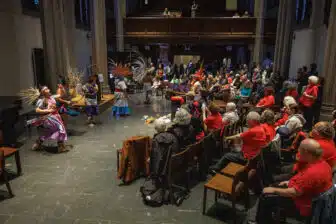
“Tonight, we celebrate the Earth and the vision and the energy that the first Earth Day brought. Here tonight, we lift up what is good and beautiful and true about
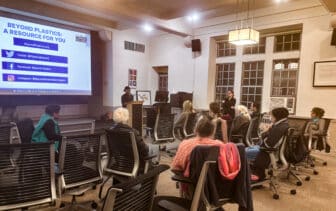
“Plastic is not just a waste and oceans issue, a climate change issue, an environmental justice issue—it’s also a public health issue. And the only way to stop plastic pollution
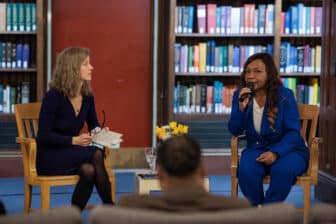
“Know that people can be transformed. I try, in each and every essay in “Holy Ground,” to talk about the power of transformation.” World-renowned environmental and climate justice activist Catherine Coleman

At the United Nations Climate Change Conference, or COP29, which met in November in Baku, Azerbaijan, climate finance took center stage. Climate finance has been a significant focus of international climate

“Ecosystem restoration can revive local traditions and deepen our bonds with land, water and other species. This is especially true when the restoration efforts are guided by the values, culture
